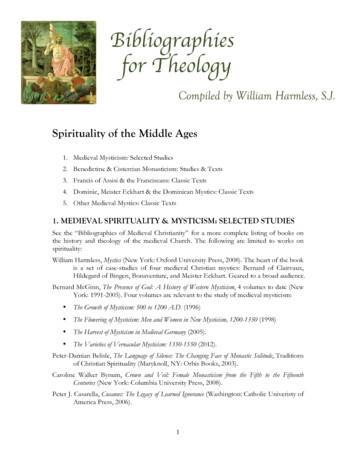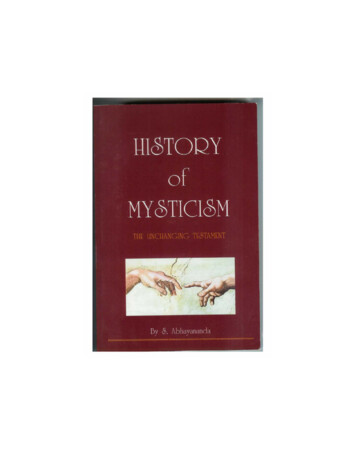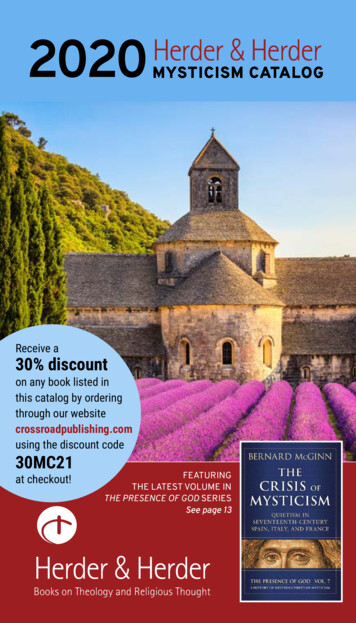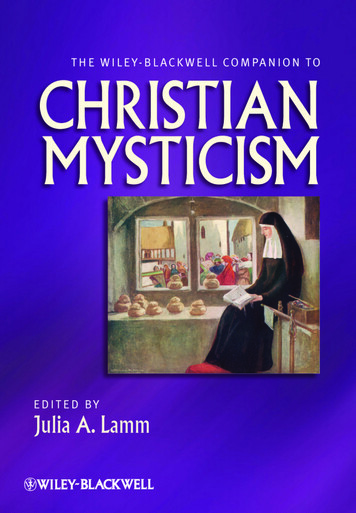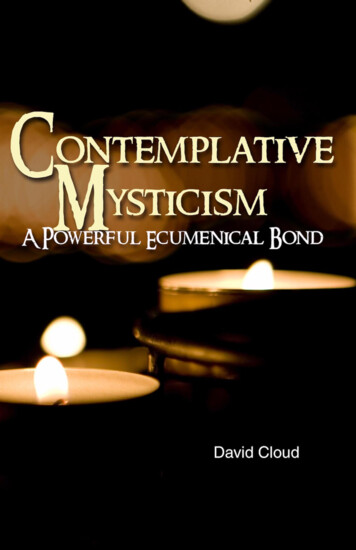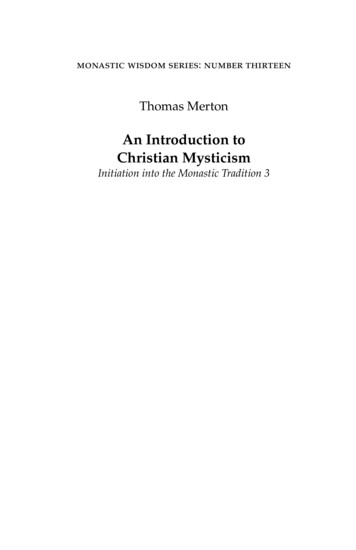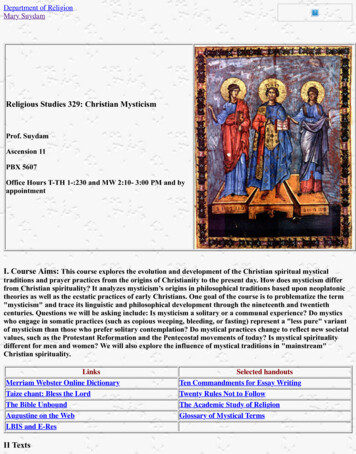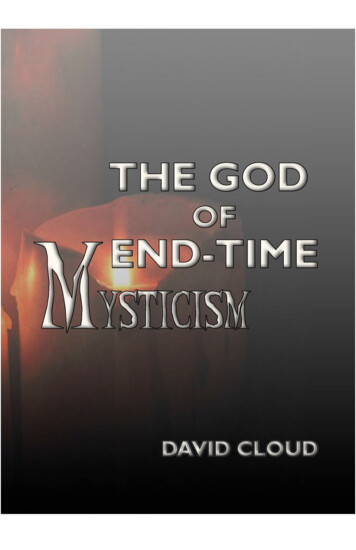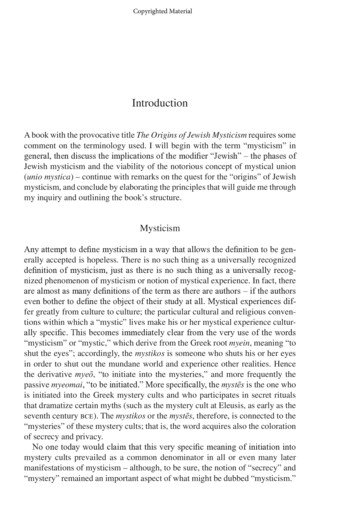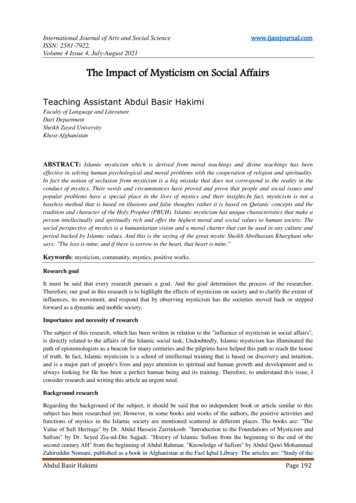
Transcription
International Journal of Arts and Social ScienceISSN: 2581-7922,Volume 4 Issue 4, July-August 2021www.ijassjournal.comThe Impact of Mysticism on Social AffairsTeaching Assistant Abdul Basir HakimiFaculty of Language and LiteratureDari DepartmentSheikh Zayed UniversityKhost-AfghanistanABSTRACT: Islamic mysticism which is derived from moral teachings and divine teachings has beeneffective in solving human psychological and moral problems with the cooperation of religion and spirituality.In fact the notion of seclusion from mysticism is a big mistake that does not correspond to the reality in theconduct of mystics. Their words and circumstances have proved and prove that people and social issues andpopular problems have a special place in the lives of mystics and their insights.In fact, mysticism is not abaseless method that is based on illusions and false thoughts rather it is based on Quranic concepts and thetradition and character of the Holy Prophet (PBUH). Islamic mysticism has unique characteristics that make aperson intellectually and spiritually rich and offer the highest moral and social values to human society. Thesocial perspective of mystics is a humanitarian vision and a moral charter that can be used in any culture andperiod backed by Islamic values. And this is the saying of the great mystic Sheikh Abolhassan Kharghani whosays: "The loss is mine, and if there is sorrow in the heart, that heart is mine."Keywords: mysticism, community, mystics, positive works.Research goalIt must be said that every research pursues a goal. And the goal determines the process of the researcher.Therefore, our goal in this research is to highlight the effects of mysticism on society and to clarify the extent ofinfluences, its movement, and respond that by observing mysticism has the societies moved back or steppedforward as a dynamic and mobile society.Importance and necessity of researchThe subject of this research, which has been written in relation to the "influence of mysticism in social affairs",is directly related to the affairs of the Islamic social task; Undoubtedly, Islamic mysticism has illuminated thepath of epistemologists as a beacon for many centuries and the pilgrims have helped this path to reach the houseof truth. In fact, Islamic mysticism is a school of intellectual training that is based on discovery and intuition,and is a major part of people's lives and pays attention to spiritual and human growth and development and isalways looking for He has been a perfect human being and its training. Therefore, to understand this issue, Iconsider research and writing this article an urgent need.Background researchRegarding the background of the subject, it should be said that no independent book or article similar to thissubject has been researched yet; However, in some books and works of the authors, the positive activities andfunctions of mystics in the Islamic society are mentioned scattered in different places. The books are: "TheValue of Sufi Heritage" by Dr. Abdul Hussein Zarrinkoob. "Introduction to the Foundations of Mysticism andSufism" by Dr. Seyed Zia-ud-Din Sajjadi. "History of Islamic Sufism from the beginning to the end of thesecond century AH" from the beginning of Abdul Rahman. "Knowledge of Sufism" by Abdul Qawi MohammadZahiruddin Nomani, published as a book in Afghanistan at the Fazl Iqbal Library. The articles are: "Study of theAbdul Basir HakimiPage 192
International Journal of Arts and Social ScienceISSN: 2581-7922,Volume 4 Issue 4, July-August 2021www.ijassjournal.complace and role of mysticism in culture" by Hassan Saeedi, which has been published in the scientific journal ofepistemological studies of the Islamic University of Tehran. "Social Mysticism" by Rudgar, taken from hismystical seminars and scientific meetings, which has been published in the information base of the SupremeAssembly of Islamic Wisdom. And some other posts and information that have not yet been published and canbe found on the free Google page.Research MethodsThe method of work in this research is library research in which first-hand, authoritative and reliable books havebeen used in this research.I.INTRODUCTIONWhen the manifestation and radiant light of the holy religion of Islam, with its flourishing, fruitful and loftydivine teachings, illuminated the darkness of the whole world and watered the thinking Muslims and seekers oftruth and human perfection from the clear fountain of knowledge and knowledge, all Motivated them to thinkfrom various aspects and aspects about monotheism and the knowledge of the truth and the ways to reach theabsolute truth and the end and the end of existence; For this reason, they sought help from the Almighty, theHoly Qur'an, hadiths, sayings, prophetic character, and religious leaders, and developed and nurtured thesupreme thought of theology and the path of knowledge, and turned it into a very large and vast school. Theybrought and learned the way of moving and moving towards the transcendence and evolution of humanity.This radiant thought and this way of life created a school of thought and science which they called mysticismand called the way and tradition Sufism. Hence, one is the way and the tradition and the other is thinking, selfknowledge, knowing the truth and reaching the truth.Islamic mysticism has a very positive and dynamic aspect; the mystic thinks and goes towards perfection andleads others; In Islamic mysticism, science, religion, piety, enlightenment, love of God and absolute perfectionappear together and bring passion, drunkenness, tension and effort. Sufis and mystics, enlightened and piousscholars and enlightened people of Khorasan and the greats of the Islamic world, using Islamic sciences andknowledge and the Qur'an and hadiths, compiled mysticism and Sufism, and discussions and conversations andexpressions beautiful and heart They also included in their books and works that many of them, especially inPersian poetry and prose, are among the scientific, literary and mystical masterpieces of Khorasan and theworld.Mysticism is the source of positive or negative actions of society?The question of the impact of mysticism on society has been raised in the minds of many throughout history,and such questions still persist, and have occupied the minds of some as to whether mysticism plays aconstructive or destructive role in society. Some believe that the role and function of mysticism in social affairsis destructive and leads to the decline of society. While mysticism has done the opposite; Because mysticism, asstudied from the beginning of history, has been a positive source and has never destroyed society. In the worksand speeches of the elders and those who are in this society, it can be seen that their efforts have always been inthe direction of implementing and enforcing the divine law and fulfilling the responsibility of brotherhood,acceptance, patience, and philanthropy. Thus, the way mysticism interacts with others in the social sphere hasnot been ineffective.Mysticism and the way it interacts with society is such that it always seeks to moderate religions, preventhardship and trust of the people, respect humanity and pay attention to the spiritual and human growth anddevelopment of the people; That is, mysticism has been constantly seeking and educating the perfect man. Hehas also always been concerned with good choices and deeds, and has believed that there is no creature orintellectual thought in the universe and that it will not be devoid of benefits for man.Abdul Basir HakimiPage 193
International Journal of Arts and Social ScienceISSN: 2581-7922,Volume 4 Issue 4, July-August 2021www.ijassjournal.comMysticism always encourages education, piety and freedom; It means the restraint of nature and self-relianceand self and away from greed. Because man was created free and he should only feel his freedom in the arms ofhis god, God Almighty, and not other than God. Always raise your hand to him. Purity and repulsion ofsuperficiality is another state of mysticism that true mystics strongly condemn superficiality and hypocrisy andpay more attention to inner truth and purity, and God's pleasure in their work and worship has always been takeninto account. Mysticism usually revolves around self-liberation and freedom from God.Undoubtedly, the divine prophets, saints and great mystics of Islam, despite being the supreme model ofspiritual movements of their time and also have played the greatest role in the positive intellectual, moral andcultural development, which continues to this day. -set. It is a fact that mysticism has always been at theforefront of change in society, and basically the memory of history never remembers that a prophet had anegative and destructive role in society. Most of the religious leaders and saints considered themselvesresponsible for the society and the affairs of the people and said that we are among the scholars and God haspromised the scholars not to rest in the face of anomalies and inequalities ( Javad Amoli, 1375: 100-101).According to the teachings and very historical evidence, it should be said that true and authentic Islamicmysticism does not mean being cut off from society; Rather, promoting and spreading the culture of love, selfsacrifice, benevolence, belief in humanism, tendency to cooperation and hacking; That is, the voice of thepeople is the voice of the Creator, and mystics do not withhold material and spiritual help from all people. Inaddition to the words of the religious leaders, these examples are very visible in their character and behavior andthe followers and educators of their school. According to Ibn Sina; The characteristic of the mystic is happiness;He has an amazing face; It is not sour; He laughs and eats and cherishes the great and respects them (Ibn Sina,1379: 391).Islamic thinker in the twentieth century, Imam Seyyed Abolhassan Nadavi says that: Mentioning the services ofSufi sheikhs in the order of historical periods is a very difficult task that requires a thick book; But there is nodoubt that the prominent moral "reformers and teachers" have made a significant contribution to building ahealthy and awake society that has been the greatest spiritual force in India (and all nations) in every age and thesource of righteous rulers. Certainly, it was the result of the morality and spirituality of these reformers andcallers and teachers and their reform efforts that a large population in these vast countries repented of their sinsand denials and followed the air of the soul and were guided to the right path. And no government, institution orlaw can influence such a large population or keep them in the circle of Islamic ethics and principles for a longtime.The positive practice of mysticism, as we have mentioned, is a matter of course, and without a doubt, mysticshave always been the standard bearers of science and knowledge, most of them have a scientific and literarytaste and have believed from the beginning that "without "Science cannot know God" and it is believed that anignorant Sufi is a toy of Satan and even harms him and harms society.Another virtue of the elders was that their educational centers were not only a refuge for thousands of homelesspeople; Food, clothing, and other necessities of life were also provided there. The existence of educationalcenters and spiritual assemblies of these reformers caused the spirit of coexistence, self-sacrifice and sympathyfor each member of the Islamic society to develop, far from the smell and color of ethnic, religious and national(Nomani, 2016: 46-47) .According to the author, what causes the difference and complexity of mysticism in society is unrealisticmysticism. And the followers of this mysticism caused discord and degeneration of the society by theirmonasteries and assemblies. In this regard, Abd al-Rahman al-Badawi has said: From a historical point of view,what may have played a destructive role in the field of civilization and caused degeneration is unreal Sufism andmysticism and the monastic historical current, not true mysticism; Because in the original mystical view ofIslam, man is a dynamic, original, creative being according to his existential capacity and through his realizationto different areas of existence and reaching degrees of the divine caliphate and the journey to the higher worldAbdul Basir HakimiPage 194
International Journal of Arts and Social ScienceISSN: 2581-7922,Volume 4 Issue 4, July-August 2021www.ijassjournal.comand meaning. , Is self-made, mobile and active, not a creature that depends on external factors; It is inspiredfrom within.In a sense; Mysticism is basically a rule and a law for living. In mystical culture, the mystic thinks ofcommunicating with people and healing the wounds of society and people. While realizing the defects of hisown soul, he has a therapeutic view of social suffering and tries, in addition to his own treatment, to treat othersso that all of them reach the lofty peak of spiritual life. He realizes that we have come to be slaves and to leadothers to slavery. And connect others to God (Badavi, 1375: 44).The rumor that is not confirmed by scientists and even history is that most of the false and baseless judgmentsthat say: Sufism and mysticism are laziness, unemployment, intellectual stagnation, and above all, seclusion andIsolation and shrugging off the burden of worldly duties and responsibilities and escaping from the field oftrying to live and build and escape from home and family. Imam Nadavi says in this regard: We reject thesebaseless and baseless ideas; Because in front of us is an interconnected chain of facts and evidence that puts anend to these false and unjustified beliefs and misconceptions, both in terms of history and realism, and in termsof the mind and thought of the argument. To prove false claims about mysticism, one should not cite the socialbehavior and attitudes of a small number of Sufis who have become isolated and isolated.Because these people are few and far between and he opened an account for them and called them among thetrue mystics. On the other hand, there is a large and considerable population of leaders of the mysticism, Sufismand sectarians who are distinguished from the group of Sufis in the field of jihad and struggle and their constantpresence in society. And their actions in society have been a model for others. Yes, true mysticism trains suchpious men (brave, heroic, field man, enemy-breaker, invincible, etc.) (Nomani, 2016: 48-49).Sheikh Farid al-Din Attar Nishaburi in relation to the idea of healthy social management of mystics in Mantiqal-Tair, which is one of the masterpieces of allegorical literature in the field of symbolic and secular language inIslamic mysticism, and the general atmosphere is a world of radiance and awareness. The discussion of themystical collective movement with the guide is depicted in a symbolic and symbolic form accompanied by abird named Hudhud. True mystics who follow Islamic mysticism are always according to the verse of theQur'an, which says in Surah Noor, verse 37: "Men who do not neglect their trade or transactions in theremembrance of God and in performing prayers and paying zakat; "They are afraid of the day when hearts andeyes will be turned upside down."What we have said about the effect of mysticism on social affairs and we present the recent opinion and wordsabout it that in Islamic mysticism; the mystic man is completely stable, militant and extroverted. He isextroverted and socialist while having intellectual perfection, spiritual path and self-purification, and he ispresent in the heart of society. The mystics, in line with the humanitarian words of the Prophet: "The believershave been so purified by the rule of friendship that if one of them suffers or grieves, the effect will betransmitted to the other; Like members; "Because one member suffers, the effect reaches every member." Theybecome transcendental human beings who have no thought other than benevolence and expediency of the peopleand base their social behavior on love, tenderness, self-sacrifice and tolerance. نهند . This spiritual insight goes sofar as to say that the great mystic Sheikh Abolhassan Kharghani says: Step on the stone; "The loss is mine, andif there is sorrow in the heart, that heart is mine."II.DISCUSSIONRegarding the effects of mysticism on society, the extent of its movement, and how much attention has beenpaid to it; By acting on it, society has degenerated or sought to make society dynamic and awake, and to awakenfrom a state of gloom and silence; It should be clearly stated that Islamic mysticism and its impact have paidimmediate attention to various social issues (politics, economics, education in scientific and practicaldimensions) throughout history, in other words, with a mystical interpretation of society as a divinemanifestation. , Leads the society from plurality and dispersion to unity and empathy.Abdul Basir HakimiPage 195
International Journal of Arts and Social ScienceISSN: 2581-7922,Volume 4 Issue 4, July-August 2021www.ijassjournal.comWith the practice of mysticism, society achieves balanced growth. That is, mysticism has played a role in thespiritual and intellectual part and in the political and material part. Islamic mysticism is a science that, based ondiscovery and intuition, in addition to the relationship between man and God, considers human relations withother human beings and seeks to make the field of society and the political scene the manifestation of goodnessand divine attributes. Let science be the source and origin of the resurrection and acquaint the society with thetruths of the universe and how to return those truths to the one truth which is the essence of one Almighty.Islamic mysticism as a survival or the end of mystical behavior dealing with society and social services is sogreat that it takes on the category of community planning and politics and organizing society for spiritualgrowth, material and spiritual rights of justice.III.RESEARCH FINDINGSDespite all the negative mentalities that some have about mysticism as a factor in the decline of society; Praisebe to Allah. Irfan was able to pay serious attention to those mentalities as a factor of change, both in terms ofattitude and in terms of positive action. Mysticism also has its effect on interacting with society in a humaneway, preventing hard work, respecting humanity and humanity. It also pays full attention to inner truth andpurity, avoiding superficiality and hypocrisy. Mysticism is also a promoter and spreader of the culture of love,self-sacrifice, benevolence, tendency to cooperation and collaboration.IV.CONCLUSIONWe conclude from the general concept of this discussion that mysticism, in spite of all the negative mentalitiesthat are woven into it, has played a prominent role and role in society. Undoubtedly, mysticism in its originalIslamic meaning, which originates from the Qur'an and the character and words of the Prophet (PBUH) and thesaints, has been able to create the greatest role and change in the individual and consequently in society. Islamicmysticism has special capacities that the use of these capacities has been able to help the Islamic civilization andthe Islamic society. Because the main characteristics of Islamic civilization and society are based onmonotheism; Therefore, Islamic mysticism also has the most concentrated conception of monotheism. It shouldbe said that the emphasis of Islamic mysticism is on the need for social presence and the status of ethics,cooperation and empathy. From the point of view of positive mysticism, human stagnation in this world is noworse in terms of value.REFERENCES[1.] The Holy Quran[2.] Ibn Sina, Hussein bin Abdullah (1379). Signs and warnings. Description of Muhammad ibn HassanTusi. Tehran: Nasr Institute Publications.[3.] Badavi, Abdul Rahman (1375). History of Islamic Sufism from the beginning to the end of the Hijricentury. Translated by Mohammad Reza Iftikharzadeh. Tehran: Islamic Education Publishing Office.[4.] Javadi Amoli, Abdullah (1375). Mysticism and epic. [Bija]: Raja, second edition.[5.] Attar, Farid al-Din Muhammad (1992). The logic of the bird. [ نشرطلوع :] ب جا .[6.] Nomani, Mohammad Zahiruddin (2016). Knowledge of Sufism. Kabul: Fazl Library Publishing.Abdul Basir HakimiPage 196
subject has been researched yet; However, in some books and works of the authors, the positive activities and functions of mystics in the Islamic society are mentioned scattered in different places. The books are: "The Value of Sufi Heritage" by Dr. Abdul Hussein Zarrinkoob. "Introduction to the Foundations of Mysticism and


